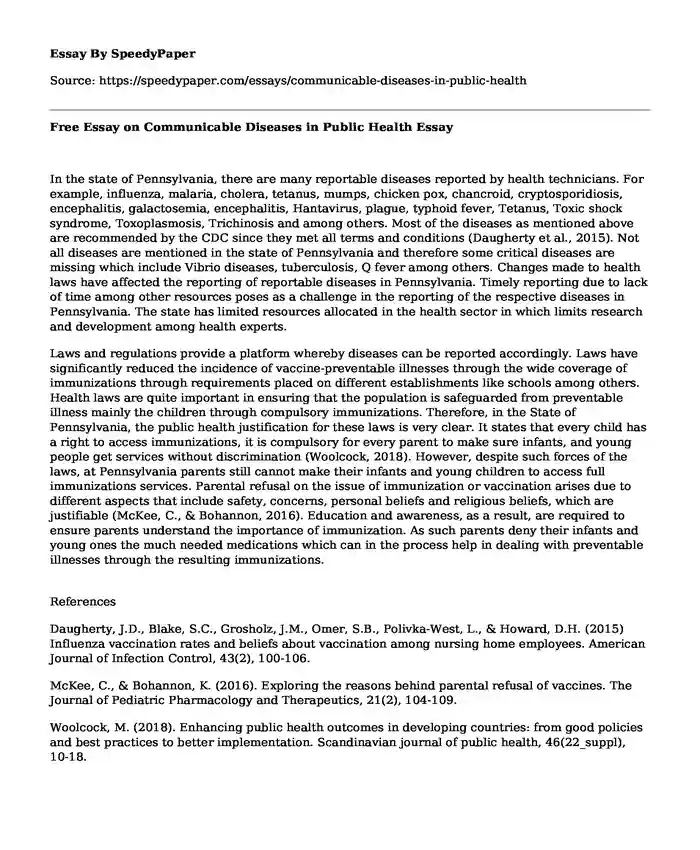
| Type of paper: | Essay |
| Categories: | Law Public health |
| Pages: | 2 |
| Wordcount: | 427 words |
In the state of Pennsylvania, there are many reportable diseases reported by health technicians. For example, influenza, malaria, cholera, tetanus, mumps, chicken pox, chancroid, cryptosporidiosis, encephalitis, galactosemia, encephalitis, Hantavirus, plague, typhoid fever, Tetanus, Toxic shock syndrome, Toxoplasmosis, Trichinosis and among others. Most of the diseases as mentioned above are recommended by the CDC since they met all terms and conditions (Daugherty et al., 2015). Not all diseases are mentioned in the state of Pennsylvania and therefore some critical diseases are missing which include Vibrio diseases, tuberculosis, Q fever among others. Changes made to health laws have affected the reporting of reportable diseases in Pennsylvania. Timely reporting due to lack of time among other resources poses as a challenge in the reporting of the respective diseases in Pennsylvania. The state has limited resources allocated in the health sector in which limits research and development among health experts.
Laws and regulations provide a platform whereby diseases can be reported accordingly. Laws have significantly reduced the incidence of vaccine-preventable illnesses through the wide coverage of immunizations through requirements placed on different establishments like schools among others. Health laws are quite important in ensuring that the population is safeguarded from preventable illness mainly the children through compulsory immunizations. Therefore, in the State of Pennsylvania, the public health justification for these laws is very clear. It states that every child has a right to access immunizations, it is compulsory for every parent to make sure infants, and young people get services without discrimination (Woolcock, 2018). However, despite such forces of the laws, at Pennsylvania parents still cannot make their infants and young children to access full immunizations services. Parental refusal on the issue of immunization or vaccination arises due to different aspects that include safety, concerns, personal beliefs and religious beliefs, which are justifiable (McKee, C., & Bohannon, 2016). Education and awareness, as a result, are required to ensure parents understand the importance of immunization. As such parents deny their infants and young ones the much needed medications which can in the process help in dealing with preventable illnesses through the resulting immunizations.
References
Daugherty, J.D., Blake, S.C., Grosholz, J.M., Omer, S.B., Polivka-West, L., & Howard, D.H. (2015) Influenza vaccination rates and beliefs about vaccination among nursing home employees. American Journal of Infection Control, 43(2), 100-106.
McKee, C., & Bohannon, K. (2016). Exploring the reasons behind parental refusal of vaccines. The Journal of Pediatric Pharmacology and Therapeutics, 21(2), 104-109.
Woolcock, M. (2018). Enhancing public health outcomes in developing countries: from good policies and best practices to better implementation. Scandinavian journal of public health, 46(22_suppl), 10-18.
Cite this page
Free Essay on Communicable Diseases in Public Health. (2022, Nov 30). Retrieved from https://speedypaper.com/essays/communicable-diseases-in-public-health
Request Removal
If you are the original author of this essay and no longer wish to have it published on the SpeedyPaper website, please click below to request its removal:
- Essay Sample Answering How to Study Effectively
- Essay Example in Dentistry: Errors when Using Ultrasonic Inserts
- Free Essay on Value Systems in Public Health Leadership
- Building the Relationships That Make Government Work - Book Review Sample
- Health Problem in Urban Community, Essay Example for Everyone
- The Medical Advancements in Mary Shelley's Frankenstein - Paper Example
- Essay Sample on Relationship Between "the Help" and Psychology
Popular categories




